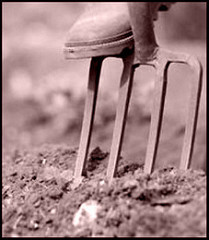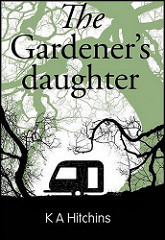Paul Alkazraji's Blog - Posts Tagged "k-a-hitchins"
A daughter of The Gardener
![kahitchins700g[1]-002](https://i.gr-assets.com/images/S/compressed.photo.goodreads.com/hostedimages/1552571608i/27205802.jpg)
Paul Alkazraji talks to novelist K A Hitchins about loss, identity and stories of redemption.

Tell us a little about yourself.
I live in Hertfordshire with my husband and two teenage children. I started writing in 2012 after two difficult experiences: the death of my father and giving up work to become a carer for a disabled member of my family. Although I was a Christian and knew that life wasn’t going to be all sunshine and roses, I struggled with the hand I’d been dealt. I became conscious of the most tremendous mental and emotional pressure. My job seemed to be about supporting everyone else while my overriding emotional experience was one of loss. I started to jot down my feelings at odd moments in the day, projecting my unhappiness on a fictional character in order to gain some perspective on my situation. After a couple of months of writing in secret, I discovered I’d finished my first novel, The Girl at the End of the Road.
The book was published in March 2016 by Instant Apostle, who also released my second novel in October 2016. The Key of All Unknown is the story of a woman who appears to be in a coma, but in reality is desperately trying to communicate with the outside world and discover who tried to kill her. My third novel, The Gardener’s Daughter, was published in March 2018.
As well as writing fiction, I speak to groups and creative writing classes, encourage other authors in their book promotion, act as Secretary and Trustee of a small charity training Christians in Togo in children’s ministry, and now also work 21 hours a week as a church administrator.
Tell us a little about your latest book.
The Gardener’s Daughter is about a girl who loses her father and runs away in search of her biological identity. As already mentioned, I had lost my own father a few years earlier and had struggled with a sense of losing my own identity. In many ways, the themes of the book resonated with my emotional life although the actual story couldn’t be further from the happy family life I experienced as a young adult. In The Gardener’s Daughter, my motherless nineteen-year-old heroine, Ava, accidentally discovers she’s adopted and in a fit of anger, runs away in search of her real father. What she discovers changes her life and her perception of herself forever.
Fiction writers put characters in dramatic situations ultimately to ‘say’ something. What are you saying in your latest work?
At the time of writing The Gardener’s Daughter I was volunteering in a Christian Union at a secondary school. I was struck by how difficult it is to explain the Gospel in a short space of time to youngsters who have very little Biblical knowledge. Whatever question they asked, the answer often needed to incorporate a potted overview of the Bible from creation, fall, incarnation, sacrifice, repentance, salvation and eternal life. All the best questions seemed to happen in the last few minutes of the sessions, and by the time a week had gone by the opportunity to continue the discussion had passed.
I decided to write a book which, on the surface would be a pacey thriller, but would in many ways be a biblical allegory explaining the grand sweep of the salvation narrative. In particular, I wanted to focus on our perennial search for identity, which is only truly found in relation to the Father heart of God. The book can be read at different levels. It’s an allegorical story and raises issues about the meaning and purpose of life, but on the other hand it’s a work of commercial fiction that can be read as a coming-of-age thriller.
Share with us a couple of sentences of your choice from your latest book.
Here’s a brief extract from chapter 1, where my heroine Ava remembers listening to her father digging in the garden.
 If I close my eyes I can still hear his spade cutting the soil with the rhythmic ticking of a clock, smell the damp peatiness of the earth. Then the quick rasping stabs of his fork as he turns the clods, worms recoiling at the invasion, until the soft, crumbling earth is ready for planting. The sound reminds me that some things have to be turned over and broken down before they are of any use.
If I close my eyes I can still hear his spade cutting the soil with the rhythmic ticking of a clock, smell the damp peatiness of the earth. Then the quick rasping stabs of his fork as he turns the clods, worms recoiling at the invasion, until the soft, crumbling earth is ready for planting. The sound reminds me that some things have to be turned over and broken down before they are of any use. I remember my last hours of ignorance as though they were yesterday. Not a blissful ignorance, because I thought I knew it all back then and was easily irritated by others. But at least I knew who I was and understood my place in the world. The thing with ignorance is you don’t know what you don’t know. I didn’t understand that knowledge can instantly change a life for good or evil. If I had, I might have reined in my impetuous nature. I know now that discovering the truth can open doors that slam shut behind you, doors through which you can never return. For me, the truth brought immediate, irredeemable pain. Discovering a bleeding hole where your heart should be will do that to you.
How does your faith influence your writing?
Although not overly Christian, all my books contain a story of redemption of some kind or another. I believe in a God who is a redeeming God – not only in the way He sent His son to take the punishment for our sins so that we can be forgiven and restored - but in the way He draws good out of the most difficult and painful situations. I’m not working towards a simplistic happy-ever-after in my stories. What I like to consider are those places we’ve all been in at times when we think we’ve lost everything and the only thing we are able to change is our perspective. We live in a culture that values success, status and possessions above all things, a world where the drive for personal fulfilment and individual self-expression can sometimes end up imprisoning us in a cycle of disappointment and despair. I hope to provoke my readers into rethinking some of the assumptions and philosophies that underpin their lives.

LINKS
www.kahitchins.co.uk
Twitter @KathrynHitchins
K A Hitchins, Author page
https://www.facebook.com/KathrynHitch...
By Paul Alkazraji:

Published on November 06, 2020 02:20
•
Tags:
christianity, fiction-writing, identity, k-a-hitchins, loss, redemption



